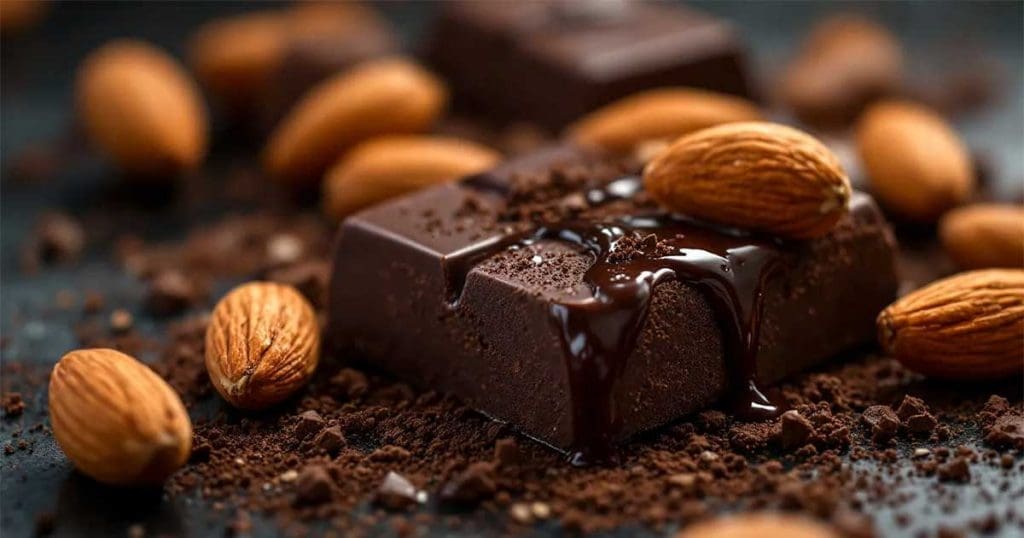On November 17th, pastry lovers across the United States come together to celebrate a rich, layered delight. This sweet treat has been a staple in many cultures for centuries. It brings people together with its crunchy, nutty, and sweetly honeyed layers.

The celebration is a time to appreciate the craftsmanship that goes into making this beloved pastry. As people mark this special day, they honor the traditions and stories behind this delicious dessert.
As we dive into the world of this layered pastry, we’ll explore its history, the art of preparing it, and its impact on cultures around the world.
What is National Baklava Day?
Baklava, a dessert with ancient roots, is the star of National Baklava Day. This day celebrates its historical significance. It honors the layers of history and cultural influences that have shaped baklava into the beloved pastry it is today.

Historical Significance of Baklava
The history of baklava goes back to the 8th century B.C. Baklava has been a symbol of hospitality and cultural exchange among ancient Middle Eastern civilizations. These include the Assyrians, Greeks, and Turks. The dessert was made with layers of phyllo dough, nuts, and honey, showing the culinary skills of these cultures.
As civilizations changed, baklava evolved too. It picked up new ingredients and cooking methods. The Ottoman Empire played a big role in spreading baklava across their territories. Today, baklava is a favorite dessert in many Middle Eastern countries, each with its own twist.
“Baklava is more than just a dessert; it’s a bridge between cultures, connecting us to our past and to each other.”
The Date and Festivities
National Baklava Day is celebrated on a specific date each year. The exact date may change. The festivities include baklava-making workshops, dessert tastings, and cultural events that celebrate baklava’s rich heritage. People gather to share their favorite baklava recipes, swap stories, and enjoy this sweet treat with loved ones.
The celebrations also spread online. People share their baklava creations and experiences on social media using special hashtags. This online engagement helps raise awareness about baklava’s cultural significance and brings baklava lovers together.
The Origins of Baklava
The story of baklava is one of cultural fusion and creativity. This pastry has a long history, with layers of phyllo and nuts showing ancient culinary skills.

Ancient Roots and Cultural Significance
Baklava’s roots are in the Middle East, where it symbolized hospitality and community. Its cultural significance is in bringing people together, at any time.
Who made baklava first is a debate. But it’s clear it’s been a key part of Middle Eastern food for ages. It’s a big part of social events and celebrations.
Variations Across Countries
Baklava has changed a lot as it traveled to new places. It’s been adapted in many ways, from Greek to Turkish, Persian, and American.
In Greece, baklava has honey and walnuts. Turkey’s version uses pistachios and a lighter syrup. These changes show how baklava has grown and changed, reflecting cultural exchange and creativity.
How to Celebrate National Baklava Day
On National Baklava Day, fans of baklava can celebrate with fun activities and treats. This day is a chance to explore the rich history of baklava. It’s a dessert enjoyed by many cultures.
Hosting a Baklava Tasting Party
One fun way to celebrate is by hosting a baklava tasting party. Invite friends and family to try different baklava flavors. You can buy it from local bakeries or make it yourself, trying out new ingredients.
To make it more fun, set up a baklava-making station. This lets guests make their own baklava, adding a personal touch to the celebration.
Visiting Local Bakeries
Another great way to celebrate is by visiting local bakeries that make baklava. These bakeries offer a variety of flavors, from traditional to new ones.
Going to local bakeries helps small businesses and lets you try many baklava flavors. It’s a simple way to enjoy the sweetness of the celebration.
The Ingredients Behind the Flaky Treat
Baklava is loved for its flaky dough, crunchy nuts, and sweet syrup. It’s a favorite in the Middle East and Mediterranean.
Key Components of Traditional Baklava
Traditional baklava has a few key ingredients. It starts with phyllo dough, made from flour, water, and oil. This dough is layered with nuts like walnuts or pistachios.
The nuts add crunch and flavor. They’re mixed with spices like cinnamon or cardamom. A sweetener, like honey or syrup, is drizzled on top.

Popular Flavor Variations
Modern baklava offers new flavors. You might find almonds or hazelnuts instead of walnuts. Different spices, like nutmeg or ginger, are also used.
Some recipes add citrus, like lemon or orange. This gives baklava a fresh twist. These changes keep the pastry exciting while staying true to its roots.
In short, baklava’s ingredients are simple yet magical. Whether you prefer the classic or a modern twist, the mix of dough, nuts, and sweetener is always a treat.
Recipes for Homemade Baklava
National Baklava Day is a great time to make this favorite dessert from scratch. Making baklava yourself lets you try new ingredients and flavors. This way, you can create a dessert that’s all your own.

Classic Baklava Recipe
A traditional baklava recipe uses phyllo dough with nuts like walnuts or pistachios. It’s sweetened with honey or syrup. Here’s what you need for a classic baklava:
- 1 package of phyllo dough
- 1 cup of chopped nuts (walnuts or pistachios)
- 1/2 cup of granulated sugar
- 1/4 teaspoon of ground cinnamon
- 1/4 teaspoon of ground cloves
- 1/2 cup of honey or syrup
Start by layering the phyllo dough, brushing each layer with melted butter. Add the nut mixture in between. Bake until it’s golden, then drizzle with honey or syrup.
Creative Twists on Traditional Baklava
While the classic recipe is loved, you can add your own twist. Try adding unique flavors like orange blossom water or rose water to the nuts. You can also use different nuts or add dried fruits like cranberries or cherries for a new taste.
For a modern twist, use different types of chocolate or add coconut flakes to the nuts. These changes can turn traditional baklava into a modern dessert that will wow everyone.
The Health Aspects of Baklava
Baklava is more than just a sweet treat. It has many health benefits thanks to its ingredients. It’s true that it’s high in calories and sugar. But it also has nuts and honey, which are good for you.

Nutritional Value of Baklava Ingredients
The main parts of baklava are phyllo dough, nuts, and honey or syrup. Nuts are full of healthy fats, protein, and fiber. This makes baklava a bit healthier.
Walnuts, for example, are packed with omega-3 fatty acids. These are great for your heart. Pistachios, on the other hand, are full of antioxidants. They can help keep your heart healthy too.
Honey is another important ingredient. It’s full of antioxidants and vitamins. It has many nutrients, but the exact mix depends on where the honey comes from. Using honey instead of sugar is a bit better for you.
“The combination of nuts and honey in baklava not only enhances its flavor but also contributes to its nutritional profile.”
Moderation and Enjoyment
Even with its health benefits, baklava is high in calories and sugar. So, it’s important to eat it in moderation. Enjoying a small piece on special days like National Baklava Day is okay.
To make baklava healthier, some recipes use less sugar. They might also add more nuts and seeds. But, it’s always important to control how much you eat. Enjoying baklava slowly lets you appreciate its taste and texture without ruining your diet.
In short, baklava is best enjoyed in small amounts because of its calories. But, its ingredients do offer some health perks. Knowing what’s in baklava helps you decide how to fit it into your diet.
The Global Reach of Baklava
Baklava has become famous worldwide, moving beyond its Middle Eastern roots. This dessert is loved for its rich taste and texture. It’s now a favorite in many cultures.
Baklava’s popularity has grown globally. It’s a key part of Middle Eastern food for centuries. Different places have made their own versions, using local ingredients.
Baklava in Middle Eastern Cuisine
In the Middle East, baklava is more than a sweet treat. It’s a sign of welcome and joy. Turkey, Greece, and Lebanon each have their own special baklava.
Turkish baklava often has pistachios. Greek versions might use walnuts or a bit of cinnamon.
“Baklava is a pastry that brings people together, whether it’s at a family gathering or a festive occasion. Its layers of phyllo, nuts, and honey are not just a treat for the taste buds but also a representation of the rich cultural heritage of the region.”
Popularity in the United States
In the U.S., baklava is a hit for special events. It was introduced by Middle Eastern immigrants. Now, it’s found in ethnic restaurants, bakeries, and homes.
The adaptability of baklava has helped it succeed in the U.S. Creative twists, like chocolate-dipped or unique nut mixes, attract food lovers.
Baklava’s global appeal shows the power of cultural sharing. As we explore new foods, desserts like baklava will keep bringing us together.
Pairing Baklava with Beverages
Pairing baklava with drinks is an art that makes this traditional dessert even better. Its rich flavors, from nuts to honey, pair well with many drinks. This makes baklava a versatile treat for any occasion.
Best Drinks to Complement Baklava
Classic drinks like coffee and tea are perfect with baklava. Coffee brings out the sweetness of baklava, while tea, like herbal or green tea, offers a refreshing contrast.
“The mix of baklava and coffee is amazing,” says a culinary expert. “Coffee’s bitterness balances baklava’s sweetness.”
Creative Cocktail Ideas
For those who want to try something new, baklava pairs well with creative cocktails. A honey-infused cocktail or a nut-flavored liqueur can give a unique twist to enjoying baklava.
Try mixing Greek ouzo with honey syrup and lemon juice. Serve it with baklava for a delightful treat.
Final Thoughts on National Baklava Day
Celebrating National Baklava Day is more than just enjoying a sweet treat. It’s about honoring the cultural heritage and traditions behind it. This day celebrates the rich history and cultural importance of baklava, a beloved pastry in many cultures for centuries.
Cultural Significance of Food Traditions
Food traditions like baklava are key in shaping our cultural identity. They unite people, build community, and connect us to our heritage. By celebrating National Baklava Day, we pay tribute to these traditions and the generations that have kept them alive.
Supporting Local Baklava Businesses
On National Baklava Day, think about visiting local bakeries known for their traditional baklava. Supporting these businesses helps keep cultural traditions alive and boosts the local economy. Whether you’re a baklava lover or just curious to try it, this day is a great chance to enjoy this tasty pastry and celebrate its cultural value.

![Black Bean Chocolate Cake [recipe]](https://b3860431.smushcdn.com/3860431/wp-content/uploads/2024/04/Black-Bean-Cake-FB-1024x538.jpg?lossy=2&strip=1&webp=1)

Facebook Comments